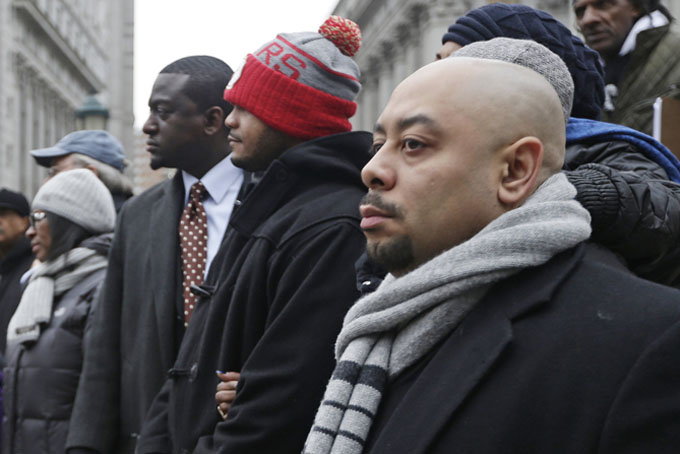
WAITING FOR JUSTICE–In this Jan. 17, 2013 photo, Raymond Santana, right, stands with Kevin Richardson, center, and Yusef Salaam, center left, during a rally in Foley Square in New York on the day of a court hearing for the three men, and two others whose convictions were overturned in one of the most notorious crimes in New York City history (AP Photo/Frank Franklin II, File)
by Colleen Long
NEW YORK (AP) — New York is a safer, less fearful place than it was in 1990, when murders hit an all-time high, race relations were raw and the city felt under siege from drug dealers and gangs on “wilding” sprees.
But one major piece of unfinished business from back then still hangs over the city and its legal system: the Central Park jogger case.
Five Black and Hispanic boys were convicted that year in the rape and grisly beating of a White woman jogging in the park, and they went on to serve six to 13 years in prison before their convictions were thrown out in 2002 because of evidence linking someone else to the crime.
They sued police and prosecutors for $250 million. But the lawsuit has languished for a decade with no resolution in sight.
Now, a growing chorus of lawmakers is asking New York City to settle with the five men. And the pressure is likely to build in the coming weeks with the broadcast of a documentary on the case by filmmaker Ken Burns. It airs on PBS on April 16.
“All of us want this over, but it’s about someone taking responsibility for what they did to us,” said one of the five, Yusef Salaam, now 38. “The money can’t buy back our lives.”
The attack on 28-year-old investment banker Trisha Meili occurred on April 19, 1989. It was one of the most notorious crimes in New York City history and it mesmerized the nation, serving as a lurid symbol of the city’s racial and class divide and its rampant crime. It gave rise to the term “wilding” for urban mayhem by teenagers.
“Drugs. Guns. Gangs. New York City was just crime central at that time,” said former New York Detective Kirk Burkhalter, recalling an era so blood-soaked that the city had a record 2,245 homicides in 1990, compared with 414 last year. “You were scared to ride the trains after dark. It was such a different place.”
When Meili was found in the brush, more than 75 percent of her blood had drained from her body and her skull was smashed. She was in a coma for 12 days, left with permanent damage, and remembers nothing about the attack. The Associated Press does not usually name victims of sexual assault, but Meili later went public as a motivational speaker and wrote a book.
Raymond Santana and Kevin Richardson, both 14 at the time, Antron McCray and Salaam, 15, and Korey Wise, 16, were rounded up and arrested. After hours of interrogation, four of them recorded confessions on video, in some cases with the boys’ parents in the room. At the trials, their lawyers argued the confessions were coerced. At the time, DNA testing was not sophisticated enough to make or break the case.
In 2002, a re-examination of the case found that DNA on the victim’s sock pointed to Matias Reyes, a murderer and serial rapist who confessed that he alone attacked the jogger. Then-District Attorney Robert Morgenthau stopped short of declaring the Central Park Five innocent but withdrew all charges and did not seek a retrial. (The statute of limitations for charging Reyes had run out; he is serving a life sentence for other crimes.)
Roger Wareham, one of the lawyers for the five, said the DNA was the key.
“There was never any forensic evidence that tied them to this case,” he said. “In 1989, everybody might not have been forensic savvy, but now, after ‘Law and Order,’ everybody knows if there’s no DNA, they didn’t do it.”
But an overturned conviction does not automatically mean there was any wrongdoing by prosecutors or police. Legal experts say the case is taking a long time in part because of the money and reputations at stake. If it were to go to trial, lawyers would have to prove police and prosecutors acted improperly. A settlement could be reached without the city having to admit wrongdoing, but so far the city hasn’t offered.
And no trial date has been set.
“This is an embarrassing chapter in the city’s history, which is why I think why the city would be anxious to settle it,” said Richard Klein, a Touro Law School professor who recently hosted a panel on the documentary. “Even if you have a different mayor and a different DA, there are so many people who look so bad.”
Celeste Koeleveld, an attorney for New York, said the city did nothing wrong in prosecuting the case.